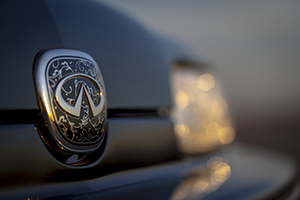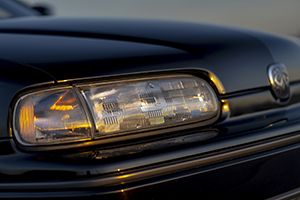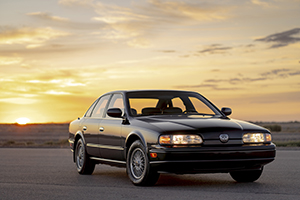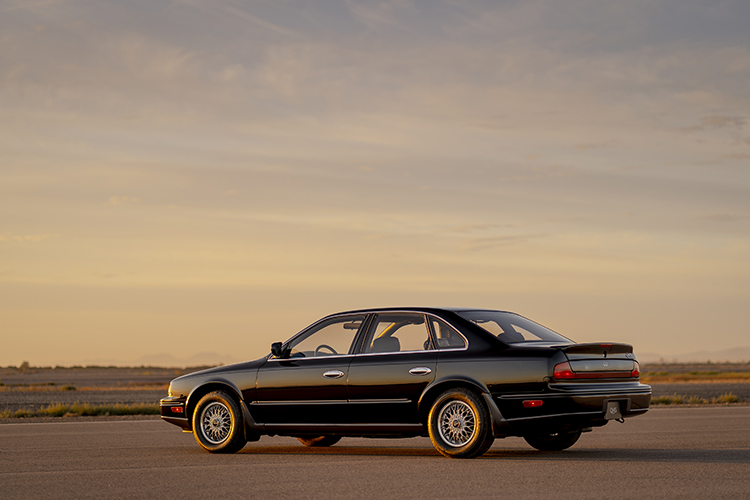Consistency ruled the day in 1985 for Americans — at least the beginning of it.
Ronald Reagan raised his right hand to take an oath for his second term as U.S. president after beating his opponent, Walter Mondale, with every other hand, foot, and anything else he could find in the historic electoral and political landslide in the United States.
If you didn't get enough MTV in 1983 or 1984, then 1985 had you set. The National Basketball Association Finals in America? The Boston Celtics vs. Los Angeles Lakers in a never-ending rivalry that would repeat over and over and over again in the coming years. Even Coca-Cola flirted with the idea of change in America, called it "New Coke," then gave up three months later only to restore the original. Not much changed, and if it did, it was met with more shade and skepticism than 1980s singer and worldwide sensation Madonna's Ray-Bans.
You could say the same for the cars in American families' garages, too. By 1985, owning a car in the U.S. was a relatively straightforward affair: domestic vs. import. Same old Ford, General Motors, or Chrysler for the former; dependable and affordable Japanese or expensive, finicky and look-at-me European luxury cars in the latter. Every automaker had its respective models, but most shared a common attribute: They were just a pain to buy from dealers in the U.S.
Enter a challenger. Time for a change, 1985.
Embed this cinemagraph on your website
"Before the '80s, quality and customer care were not big items," says Dean Leathers, product specialist for INFINITI in America in 1986 and an early brand champion. Dean, a young executive in 1986, towers at well over 6-feet tall but chops down any hint of intimidation with an infectious smile and patient voice. By then, Dean was on an accelerated rise in the automotive industry ranks, completing tours of duties at a cadre of domestic and import manufacturers. His perspective on the automotive industry is spot on, even if it's from the inside. Buying a car was something people endured, Dean says, not enjoyed. Shopping for a vehicle was a first-class ticket to frustration where you were less than a customer. You were merely an "up," a less-than-friendly term salespeople used to assign each other walk-ins, e.g., "You're up."
"From the very beginning, the essence of (INFINITI) was people. Whether it be the customers, or the people within the division, or the retailers. That was at the heart of everything, was to run a human brand," he says.
It's hard to imagine that people didn't want something different. But their buying habits indicated that different for different's sakes wasn't good enough. It had to be better than that.
Dean knew that well, as did the Horizon Task Force, the precursor to the INFINITI Motor Company formed in 1986.
"Part of the business case for a luxury brand has to consider the emotions and the psyche of the consumer. Would the consumers have the emotional acceptance of a Japanese luxury brand? Or would they still pigeon-hole anything that came out of Nissan as, 'Oh those are the guys that build those really high-quality, durable cars and trucks,' and not be able to get beyond that?" Dean says. "The answer that the Horizon Task Force came up with … and it took about a year: It's worth a shot."
It took three years for the developing INFINITI brand to formalize into a full-fledged automaker — signs, dealers, letterhead, the works. In the early days, Leathers and INFINITI brass found their hook: customer service and respect. It hasn't changed.
"We thought we're going to have a great vehicle, but if we really go down this customer experience path, we could be on to something," Dean says. "We went into fairly great depth to define what luxury meant to people in the United States. And one of the things that kept popping up wasn't necessarily softer seats and better air conditioning … but luxury actually started to be a lot about time."
Perhaps it's not coincidental that one of the early focal points of the INFINITI flagship was a clock. The rest of the new luxury brand's first car, the Q45 sedan? That had some explaining to do.
The four-door full-size sedan lacked features most would consider necessities for luxury in the late-1980s, which included lots of brightwork, lots of overstuffed leather, lots of distraction. The Q45 sprinted in the other direction, led first by a world-class V-8 engine that by many accounts — including Dean's — sandbagged its performance potential on paper.
 |
 |
 |
"Nobody ever called the Q45 conventional, but we knew it wasn't going to be something for everybody. That was great because we didn't want something for everybody. We didn't want to blend in. We wanted to make a statement."
The Q45 lacked a conventional grille. Why? It didn't need it. It didn't stop there.
"One of the parts about the INFINITI Q45 that was very different was the interior design, the interior aesthetic. On one of my trips over to Japan, (INFINITI Head Designer Takashi Oka) and the team were talking about the Japanese tea ceremony … (that) took place in a room that was very spartan, very bare, with only a few decorations. During the tea ceremony, certain decorations insert, and elements of the room would be moved in or moved out. There's a feeling or a philosophy that to really get the most out of the beauty and aesthetic of any one thing, you want to minimize the visual noise — you want to minimize distractions — so that the person can focus on that vase, or that picture, or that plant. The Q45 had a very simple clean look to it that stemmed from that aesthetic philosophy."
In 1989, INFINITI took flight in more than just a figurative sense: its first television commercial featured geese — not a car.
Embed this cinemagraph on your website
That kind of convention-defying attitude didn't stop for the next 32 years, leading up to its most recent birthday in 2021. Since then, INFINITI has pioneered groundbreaking designs (the first luxury crossover-coupe, the FX), technologies (VC-Turbo and ProPILOT Assist), and more. With more on the horizon.
Since its founding, the tenet that's remained to INFINITI: it consistently cares about being a human-centric brand.
Embed this cinemagraph on your website
Dean agrees, "I think that one thing that has become crystal clear, merely 35 years after we first started talking about what we could call human-centric, we were proven right. When you take care of your customers, treat them as honored guests, and really focus on customer needs and team member needs, that is a winning strategy for business — not just the car business — any business."
Related Release : "Looking back, looking ahead: INFINITI marks birthday with brand origin series to reveal founding principles"

